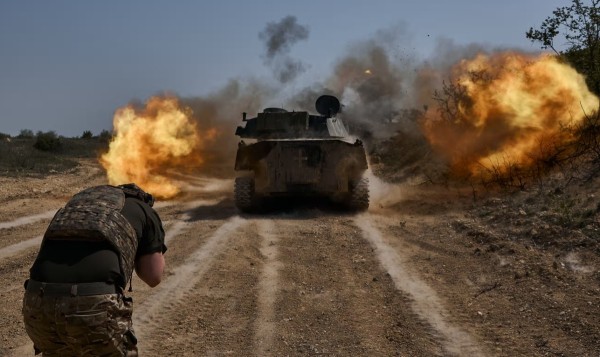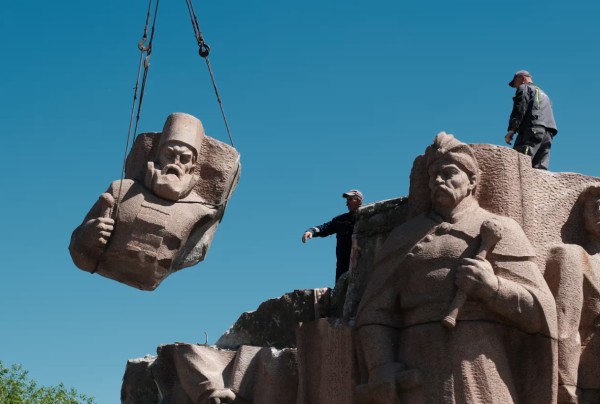Enn Tarto’s memories of Christmas during the Soviet occupation years, as recounted during the Memento Christmas conference of December19, 2004 in Tartu, Estonia.
Christmas Eve, 1956
On the evening of 24 December 1956 a group of school students, the majority of who were members of the Eesti Noorte Malev (underground Estonian Youth Groups, collectively called Maleva) celebrated Christmas Eve in Tartu at the Voldemar Café located on Kastani Street. I was 18 years old at the time. While in the café, we noticed that several suspicious men were hanging around the building.
The next day we were off to Tartu’s Third High School for the afternoon session. On Puiestee Street in front of St. Peter’s Church a personable man stopped me and asked me a question: “Young man, can you tell me where I can find Peetri Street?” I began to explain that Peetri Street ran parallel to Puiestee Street, when four men unexpectedly assaulted me and pushed me into a car waiting on Narva Street (formerly Leningradi Street). From there I was driven to Tartu’s KGB headquarters located on Vanemuise Street.
That seemingly friendly man asking about Peetri Street turned out to be KGB officer Randar Hiir, Erni Hiir’s son and later an important figure in VEKSA (an organ of the Estonian KGB meant to develop ‘cultural ties’ with Estonians living abroad for the purpose of disrupting their organizations’ opposition to the Soviet Union’s occupation of Estonia).
That the KGB had planned to attack the Eesti Noorte Malev on Christmas Eve was no coincidence. The KGB had brought a large force of agents to Tartu, amongst them KGB officer Leonid Barkov, who later became the head of their interrogation section and a KGB general.
The most talkative communist was a translator named Ortolenko. He wished me a “Merry Christmas!” in Estonian while I sat in the office of Tartu’s KGB chief. In addition to this he added a veritable avalanche of Russian swear words with the following approximate meanings: Damned milksop, greenhorn, puppy, nationalist, bastard, etc. Comrade Ortolenko’s diatribe was spiced with foul profanities.
I happened to look at a large photo of Feliks Dzerzinski (head of the CHEKA, the USSR’s first secret police force) hanging on the wall. Ortolenko noticed this and began to shout more violently at me. The idea behind his yelling was to remind me that if I had fallen into the KGB’s hands a few years earlier I would have received a thorough beating specifically because it was Christmas. On Christmas Day I and the other arrested schoolboys were sent to Tallinn’s Battery Prison.
Christmas 1958 – my next powerful memory.
The boys of the Eesti Noorte Malev were found guilty according to Soviet Russia’s NFSV Criminal Codex § §58-10 and 58-11. I was sent to camp p/k z-h-385/7 for political prisoners located in the Zubovo-Poljanksi region of the Autonomous Socialist Soviet Republic of Mordovia.
It was a large camp with about 1,700 – 2,000 men, of which 120 – 150 were Estonians. Lithuanians and (western) Ukrainians were the largest ethnic groups in the camp. On the evening of 25 December, at around 7:30 pm, the Baltic prisoners, under the leadership of the Lithuanians, organized a Christmas celebration in the large canteen. Approximately 600-700 men attended: Lithuanians, Latvians, Estonians and other guests, above all the western Ukrainians.
There were some 20 Christmas trees in the canteen, candles, some ginger cookies and cakes. Lithuanian priests offered a service, the Catholics held Communion, and spiritual songs were sung.
Of course, the prisoners did not celebrate Christmas in peace for very long. Early on the concentration camp’s duty officer arrived with some guards and demanded an explanation of the proceedings. He was given an explanation. He ordered all prisoners back to the barracks. The prisoners resisted. The guards went away and told all the remaining prisoners in the barracks that a film was being shown in the canteen. The other prisoners – Russians, Byelorussians, (eastern) Ukrainians, Caucasians and Central Asians – stormed into the canteen to watch the ‘film.’ We explained to our fellow prisoners that there was no film and that it was a provocation by the guards. Our co-prisoners listened to our explanation and returned to their barracks. The guard towers around the camp were reinforced with two extra guards to the usual one, and each corner tower was issued a machine gun.
Then the camp commander came into the canteen with 30 men and demanded that we clear out immediately. The commander threatened to use force and gestured towards the machine guns. The threat was serious, as four years earlier gunfire and even tanks had been used to suppress and kill prisoners in rebelling camps. This time this did not happen. The prisoners did not give in, and the bosses ‘consulted with Moscow,’ which meant they spoke with the local communist leaders. Finally, it was agreed that we would finish our Christmas celebration at 9:30 pm, clean up the canteen, and that we would be in the barracks by 10:00 pm which was the start of the so-called all quiet period. This successful Christmas Eve celebration was also a victory for us in political terms. God had helped us.
Of course, the organizers were later punished in various ways. Because I was one of the Estonian organizers of the Christmas celebration, I was denied permission to return and live in Estonia after my release. My release papers showed that Petseri was to be my initial residence.
1984 - a third significant memory of Christmas Eve, twenty-six years later.
On 19 April 1984 the Supreme Court of the Estonian SSR declared me a political prisoner for the third time for so-called activities of anti-Soviet agitation and propaganda, whereby I was given a ten-year prison sentence together with a five-year sentence of exile. In addition to this, this court of occupiers proclaimed me ‘an extremely dangerous state criminal,’ and they called me ‘a particularly dangerous recidivist (habitual criminal)’. Because of this, my punishment was carried out under special conditions in a hard labour corrective work camp.
I was taken to Kutsino death camp VS-389/36-1 located in the Perm Oblast. Here we wore striped clothes. We lived in cells and were taken to similar work cells. Each cell had its own work cell. My cellmates included the Ukrainian poet and national hero Vassili Stuss, Azat Arsakian (Armenian), and a clergyman from Ukraine, Semjon Skalits (nicknamed Ded Pokutnik).
In general, during the intervening years the guards did not interfere with the political prisoners’ modest Christmas celebrations. The prisoners always managed to scrounge up some fir tree branches and candles. This year, however, everything was confiscated during repeated searches. But when we came in from the exercise yard we found a finger length fragment of fir tree branch in the corridor. We put some margarine onto foil paper and into the margarine we put a wick made from twisted blanket threads. We were permitted to have matches, and thus were able to light the candle. We prayed as holy man Ded Pokutnik sang spiritual hymns.
Suddenly the door to our chamber banged open, and the duty officer with two guards barged into the room. They hurled our little fir branch and candle to the floor and stomped on them with their boots while they threatened us and swore at us with obscenities.
Semjon Skalits started to make the sign of the cross at the guards while at the same time murmuring something quietly. The guards calmed down a bit and ceased their swearing, and then they brought a broom and pan and took the remains of our fir branch and candle away. They then left the cell, and when the door was locked the duty officer opened the port and told us that making our own candles was expressly forbidden, and that generally everything was forbidden, including singing. He told us to sit quietly in thought and in spirit with our God who did not exist. Thus we sat, talking quietly. Ded Pokutnik read religious poems, and we prayed and celebrated Christmas Eve.
Today all my cellmates are dead. The Ukrainian poet and national hero Vassili Stuss (born 1938) died in that same Kutsino death camp on 4 September 1985.
My other cellmate, clergyman Semjon Skalits (born sometime around 1925-28) was a pokutnik (a member of the Uniate Church). During one search over 700 national-religious poems were confiscated from him. He was freed from the camp because of illness in 1987. He died shortly thereafter.
Azat Arsakian (born 1950) was freed in 1987. He was twice elected as a member of the Armenian parliament. He is now dead.
Time passes, but memories of those Christmases and of my brave cellmates remain.
(Note: Enn Tarto, born in 1938, is a former Estonian political prisoner during the Soviet Union’s occupation years. He has received many honours and has held many important and influential positions in Estonia, including:
• Member of Estonian Parliament from 1992 – 2003;
• Chairman of the Council of Elders of the Estonian Defence League 1993 – 2003, and;
• Member of Tartu City Council since 1999.
He was included in the list of 100 Outstanding Estonian Figures of the 20th century by Eesti Päevaleht, Radio Kuku, National Library of Estonia and TV3.
He currently lives in Tartu with his wife Piret and 3 children.)
Christmas memories during the Soviet occupation years (9)
Archived Articles | 15 Dec 2006 | EWR
Viimased kommentaarid
Kommentaarid on kirjutatud EWR lugejate poolt. Nende sisu ei pruugi ühtida EWR toimetuse seisukohtadega.
This Christmas tale reminds me of a story my sister told me whilst on the way to a funeral. She was visiting Estonia in 1985 for Christmas. After shopping, where the only items worth giving, were available from the shop for foreigner at inflated prices, for Christmas presents for relatives, she arranged for a Christmas dinner at the Viru hotel (all foreigners had to stay there). Our relatives arrived and all the group was happy and cheerful. Then they went tothe room where the Christmas dinner was set out. But the staff were horrified and "Nyet, Nyet ..........", and told her very angrily that Estonians were not permitted to eat at the Viru Hotel. on accompanying my sister after the other relatives had left, my auntie went with her to her room to freshen up before going out to seek another venue. Her visit was interrupted by the maid barging in the room and hurling abuse at my Auntie. I always think of this recollection of Christmas in Estonia in 1985 as a genuine Soviet-style Christmas welcome from one tovarisch to a foreign visitor and their family.
Olen ise ka väga vähe kirjutanud viimasel ajal, lihtsalt ei ole olnud selleks aega. Häid pühi sulle ja ka kõikide sõpradele ja ka kriitikutele kellega olen arutanud siin maailmaasju!
Tere kõigile ja häid Pühi. I note with some sense of regret that no-one has come here to take my place,and all argument has literally disappeared from this site. In any case, I'm sure you'll deal with it in your own way, because you cannot silence good opinion forever. Or maybe in Canada you can-who knows for sure. All the best to everyone! Maxim.
Archived Articles
TRENDING




















